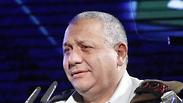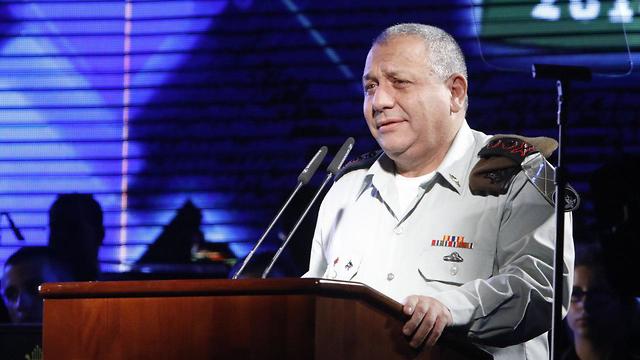

IDF chief seeks to mend rift with Druze after Nationality Law
After second Druze IDF officer announces resignation in protest against law that has sparked fury among critics, Gadi Eisenkot joins chorus of Israeli leaders ensuring community that 'safeguarding human dignity, regardless of ethnicity, religion or gender is how it will always be;' echoes plea by Druze heads to keep political disputes out of the army.
Eisenkot, who urged soldiers and commanders to refrain from dragging the political dispute caused by the law into the military, was seeking to reduce tensions among the Druze minority population after a second Druze IDF officer announced on his Facebook page the same day that he intends to resign from the army in protest.
The law has caused controversy since it passed in the Knesset earlier this month, mainly due to a clause stating that only Jews have the right of self-determination in the country.
The clause has been the subject of fierce criticism and has caused offense among the Druze community, many of whom serve the country loyally in the IDF.
The Nationality Law also states that the State of Israel is the nation-state of the Jewish people and that Hebrew is the official language of the state. Arabic, spoken by the Druze community, was downgraded as an official language and defined as having a special status, with the official state use of Arabic to be determined in separate legislation.
“As an army with a state whose purpose is to protect the security of the residents of Israel and victory in war, we are committed to safeguarding human dignity, regardless of ethnicity, religion or gender,” Eisenkot said. “That is how it has always been and that is how it will always be.”
Earlier, 23-year-old Shady Zidan became the second Druze officer to announce his protest resignation, raising fears that it could precipitate more to follow suit.
“Until this day I have given the state my soul, I have risked my life. Until this day I stood by the state’s flag with pride and saluted it. Until this day I sung the national anthem ‘Hatikvah’ because I was sure that this is my country and I am equal to everyone. But today, today I refused for the first time in my service to salute the flag, I refused for the first time to sing the national anthem,” said the officer who has been in uniform for five years.
Eisenkot’s attempt to assuage the rising fury over the hotly contested law was the second of the day as he echoed the calls by heads of the Druze community in Israel, including spiritual leader Sheikh Mowafak Tarif.
“Members of the Druze community serve and will continue to serve in the IDF with their heads held high, with determination and out of a sense of obligation to their homeland," a Druze statement said.
“The disputes regarding the Nationality Law must be left in the appropriate framework and outside the army and military service,” the statement continued, warning caution not to “blur the lines between the two. We will continue to campaign to fix the law so that it provides equal rights and citizenship.”
On Sunday, Druze officer Capt. Amir Jmall wrote an open letter to Prime Minister Benjamin Netanyahu decrying the law.
“Mr. Prime Minister, I have sat by myself and after many thoughts that have gone through my head, I have decided to express my opinion about the Nationality Law that you and Knesset members have implemented," wrote the officer on a Facebook post, before deleting it shortly after.
“My two older brothers were also combat soldiers who participated in Operation Cast Lead and Operation Pillar of Defense and I participated in Operation Protective Edge. I wanted to share with you, Mr. Prime Minister, and with all the people of Israel what I feel at the moment and share with you the thoughts that are running through my head,” wrote Jmall, a company commander.
“This morning when I awoke to drive to the base I asked myself why. Why should I serve the State of Israel, the state that I and my two brothers and my father served with devotion, a sense of mission and with love of our homeland when in the end what do we get? To be class B citizens? To continue to serve the country?” he asked.
“I don’t want to continue and I am sure that hundreds more people will stop serving and ask to be discharged from the IDF due to your decision, Netanyahu—yours and your government,” the officer continued.
The IDF released a response to Jmall’s post saying that “soldiers and officers, members of minorities, in mandatory, permanent or reserve service have been and will always be a central part of the IDF, on the battlefield and in routine times. Their contribution throughout the years is worthy of praise and the alliance with them has been forged in blood.
“The IDF is a stately people’s army, and unity among the ranks is stressed in all types of activities regardless of religion or gender,” the statement said, before reminding Jmall of IDF protocol regarding political statements.
“The expression of a political statement is not authorized by army orders. The officer was invited to speak with his commander,” it said.


















